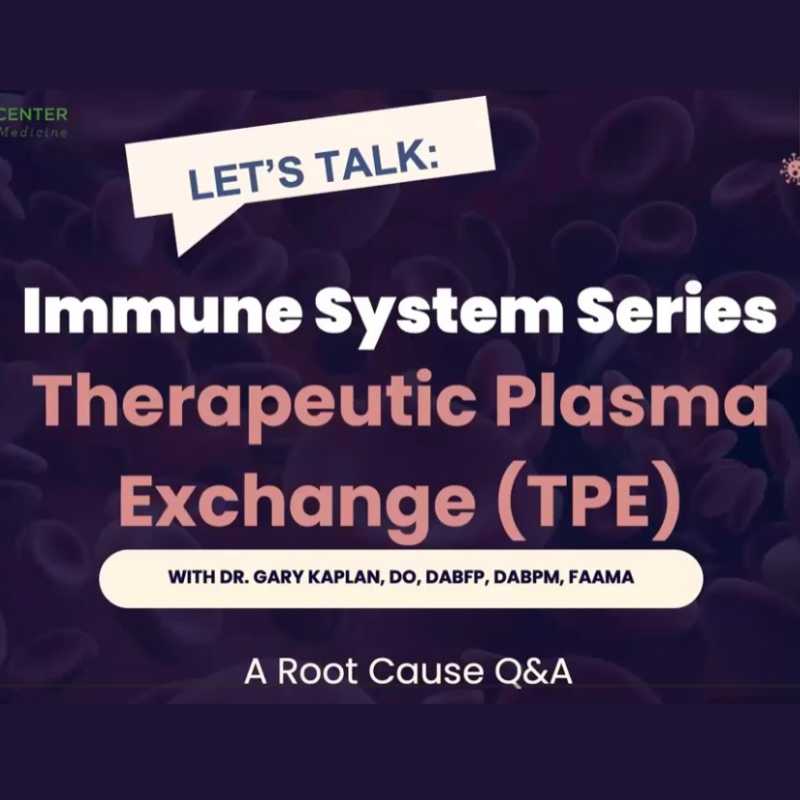
5 Ways We Can Keep Your Immune System Strong
December 10, 2025/by Kaplan Center
Want to Take Your Workout to the Next Level Next Year? These Tips Can Help
December 8, 2025/by Kaplan Center
Dr. Kaplan’s Dos and Don’ts of the Holiday Season
December 3, 2025/by Kaplan Center
Let’s Talk Webinar – A Root Cause Q&A
December 2, 2025/by Kaplan Center
Navigating Holiday Meals with Gut Issues: Simple Tips for a Comfortable Season
December 1, 2025/by Chardonée Donald, MS, CBHS, CHN, CNS, LDN
Craniosacral Therapy for TMJ | Say Goodbye to the Daily Grind
November 19, 2025/by Patricia Alomar, M.S., P.T.
From Compassionate Care to Personal Healing: A Letter to My Patients
November 18, 2025/by Kaplan Center
8 Steps to a Healthier Gut—and a Longer, Healthier Life
November 18, 2025/by Kaplan Center
Mid-Life Irritability & Fatigue Improved by Hormonal Balancing
November 13, 2025/by Lisa Lilienfield, MD
From Challenges to Change: Dr. Kaplan on Healthcare’s Biggest Challenges
October 29, 2025/by Kaplan Center
Overlooked Dangers of Mold Exposure and How to Stay Safe – Dr. Kaplan Talks to WUSA9
October 27, 2025/by Kaplan Center
Let’s ‘Fall’ Into Wellness: A Nutritionist-Approved Immune-Boosting Recipe for Cold and Flu Season
October 13, 2025/by Chardonée Donald, MS, CBHS, CHN, CNS, LDN
PANS/PANDAS – When Sudden Symptoms Signal Something More
October 9, 2025/by Kaplan Center
Beating Burnout, A Nutritionist’s Perspective
October 1, 2025/by Chardonée Donald, MS, CBHS, CHN, CNS, LDN
3 Things That Can Happen After Stopping GLP-1s
September 11, 2025/by Chardonée Donald, MS, CBHS, CHN, CNS, LDN
What Families Need to Know About COVID and Flu Season
September 3, 2025/by Kaplan Center
September is Pain Awareness Month
September 1, 2025/by Kaplan Center
Dr. Kaplan Spoke to Northern Virginia Magazine About COVID, Flu, and Immunity — Here’s What You Should Know
August 14, 2025/by Kaplan Center
“Why Do I Feel Like Crap?”: The Overlap Between Long COVID and Perimenopause
July 30, 2025/by Kaplan Center
Why People Are Turning to EMDR (and Why You Might Want to Too)
July 23, 2025/by Kaplan CenterAre you looking to improve your overall wellness?
Personalized care you can trust.
Our integrative, non-surgical treatment approach is highly successful in maintaining wellness and also treating chronic pain and illness. For more than 30 years, we have delivered superior, cutting-edge health care in the Washington, DC area.
QuickLinks
Contact Information
Tel: 703-532-4892
Fax: 703-237-3105
6829 Elm Street, Suite 300
McLean, Virginia 22101
Map It
Hours of Operation
Mon – Thu : 8 am – 5 pm, ET
Fri : 8 am – 12 pm, ET
Snack On This!
/in Nutrition/by Kaplan CenterSmart snacking means keeping your carbohydrate and protein intake in balance. It will not only maintain your energy level throughout the day, but will also help stabilize mood and mental clarity. Need some ideas? Here are some of our favorite snack combinations!
TIP: Keep carbs to 15g per snack maximum.
Complete Protein & Carbohydrate Snacks
We are here for you, and we want to help.
Our goal is to return you to optimal health as soon as possible. To schedule an appointment please call: 703-532-4892 x2
LISTEN NOW: Beyond the Pain with Dr. Gary Kaplan: A Journey into Integrative Medicine
/in Long Covid, Wellness/by Kaplan CenterDr. Kaplan was a guest on the Off-White Coat Podcast, hosted by Jordan Abney.
Episode Description:
Are you tired of enduring chronic pain, battling with unyielding fatigue, or wrestling with relentless depression? I know I was, but there is hope, my friends. I invite you to join me and our guest, the renowned Dr. Gary Kaplan, as we navigate the perplexing world of chronic illnesses. Dr. Kaplan brings his groundbreaking insights on chronic conditions and a unique neuroinflammatory approach to treatment that might just change the way we understand and manage these persistent foes.
We discuss the pitfalls of our medical system, including the unscrupulous dealings of pharmaceutical and insurance companies, and the lack of resources available to emergency doctors. These realities are frustrating, but we face them head-on, sharing personal experiences like Dr. Kaplan’s journey with his father’s medical challenges. The riveting conversation also unveils the psychological and environmental factors that play a crucial role in diagnosing and treating chronic illnesses.
We wrap up by delving into the latest advancements in immune dysfunction research and the role of cross-disciplinary collaboration in propelling this field forward. We explore promising treatments for Long-COVID, the importance of early testing, and the potential implications of different COVID variants. Brace yourselves as we reveal the secrets of supercharging your immune system and effective anti-aging methods. So, buckle up and join us on this enlightening journey that dares to challenge traditional perspectives on chronic illness, shining a light on the power of integrative medicine.
We are here for you, and we want to help.
Our goal is to return you to optimal health as soon as possible. To schedule an appointment please call: 703-532-4892 x2
Physical Therapy: The Right Touch For Your Musculoskeletal Pain
/in Treatments/by Gary Kaplan, DOPain can come in many forms; it can be the result of an injury, surgery, or an illness; it can be intense pain or a subtle ache; it may be acute or longstanding, localized or widespread. However it manifests, the bottom line for anyone in pain is: the sooner the recovery, the better the quality of life.
Pain is often an indicator of an imbalance somewhere in the musculoskeletal system. Our body’s magnificent framework is made up of bones, muscles, joints, tendons, and ligaments that work together to provide stability, put us in motion, and support the proper functioning of all our vital organs and their systems. When there is an imbalance the body overcompensates, eventually causing fatigue, inflammation, and dysfunction in the area.
Physical therapy offers undeniable value when treating musculoskeletal pain. With extensive training in manual skills and a comprehensive understanding of body mechanics, physical therapists can treat a wide range of musculoskeletal pain problems. For example, there are physical therapists who help patients recover from sports injuries or strokes, others who work primarily with patients suffering from pelvic floor dysfunction, and those who specialize in Craniosacral Therapy, which may provide symptomatic relief from chronic neck and back pain, migraine headaches, fibromyalgia, temporomandibular joint syndrome (TMJS), and traumatic brain injuries, among many other conditions. While some physical therapists specialize in working with children and infants, others work primarily with adult or geriatric patients.
Fundamental benefits of PT
Encourages physical activity
PT requires movement! The inclination may be to take time off from exercise when in pain. However, physical therapists are able to “prescribe” exercise programs appropriate for a patient’s specific medical condition. With the right program and under the right guidance, the body continues to move, which promotes heart health, bone health, mental health, and more. In other words, staying active is critical for healing and for lowering the risk of other illnesses in the future.
Promotes natural healing
PT, like other alternative therapies, promotes the body’s natural healing process and does not come with the cost and risky side effects of powerful pain medications and invasive measures like surgery and injections. Because of the massive opioid crisis, in 2016 and again in 2022, the Centers for Disease Control changed its clinician guidelines to recommend physical therapy and other nonpharmacological therapies as a first line of treatment for chronic, non-cancerous pain conditions. While there is an appropriate time to consider opioids for acute pain management, physical therapy should be the first line of treatment for musculoskeletal pain, and, depending on your condition, may very well be the only treatment you need.
Restores function
PT teaches individuals about body mechanics for sitting, standing, and lifting. Patients are educated about their body’s limitations and given an individualized program that will gradually improve their range of motion, muscle strength, and stability for a faster and more complete recovery so they can reengage in life.
Teamwork makes the dream work!
Teamwork is defined as “the combined actions of a group of people working together effectively to achieve a goal.” Working with a physical therapist will provide instruction, encouragement, and consistency in your healing process.
In sum
Fundamental health relies on a healthy musculoskeletal system so that other critical systems, like the neurological, circulatory, and hormonal systems, can function properly too. Physical therapists are expertly trained to locate and rehabilitate deficiencies in the musculoskeletal system for a more complete recovery.
If you have a pain problem, your physician should take a thorough medical history, including asking questions about the special characteristics of your pain, including its duration and the particular sensations you are experiencing. This will not only help to accurately identify the cause or causes of your pain problem but will also eliminate other possibilities. If physical therapy is in order, your doctor can help you find a physical therapist with the right set of skills to meet your medical needs.
To schedule an appointment with a Kaplan Center physician to see if physical therapy is appropriate for you, please call 703-532-4892. Physical Therapy orders from non-Kaplan physicians can be used for treatment here.
We are here for you, and we want to help.
Our goal is to return you to optimal health as soon as possible. To schedule an appointment please call: 703-532-4892 x2
This article was originally published in October 2018. It was reviewed and updated in October 2023.